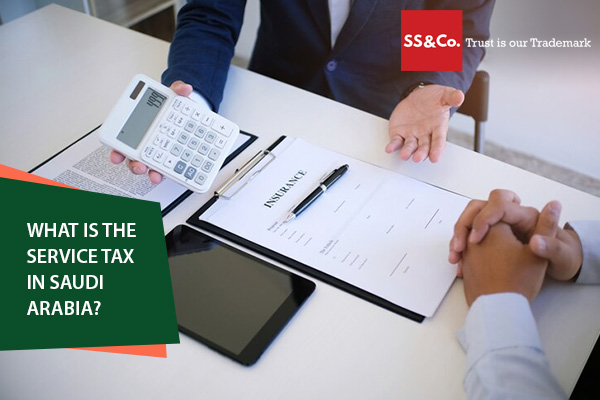What is the service tax in Saudi Arabia?

In every service transaction, there are always some reserved charges that are added to your bill to contribute to the nation’s economic goals. This is usually taken in the form of VAT on services, which includes all services from consultancy sessions and hotel stays to important maintenance work. With every service that is provided, this tax makes sure that a company is not just offering value to clients but also making a contribution to funding public projects, infrastructure, and social welfare programs. Apart from VAT, several other taxes indirectly impact the service charges as well, which need to be completely understood for complete compliance.
These taxes are more than a legal obligation; they are about becoming involved in the country’s growth, stability, and future well-being.
1. Value Added Tax (VAT)
VAT is an indirect tax that is imposed on goods and services during each stage of the supply chain, be it production or consumer sales. VAT was introduced in KSA in January 2018 with a fixed rate of 5% with the goal of minimizing the dependence on oil. Later, after the COVID-19 pandemic, it was increased to 15% on July 1, 2020, due to poor economic conditions. The rates of VAT on Services are:
- A typical rate of 15% is fixed for most of the services
- Zero-rated services like export, international transportation, and applicable medicines are charged with 0% VAT rate
- For Exempt services, no VAT is charged. It includes financial services, residential real estate leases, life insurance services, and specific education and healthcare services, where the government usually covers VAT for consumers
For the registration of VAT, businesses that have an annual taxable income over SAR 375,000 are mandated to register; businesses with revenues over SAR 187,500 can also voluntarily register to gain benefits and investors’ confidence. VAT is generally filed monthly; however, businesses with profits under SAR 40 million are required to file quarterly. Businesses are obliged to use the Fatoora (e-invoicing system), which includes real-time validation of invoices, QR codes, cryptographic stamps, and unique invoice identifiers. In case of non-compliance with VAT, ZATCA charges heavy fines, penalties, and even license suspension for more severe cases.
2. Withholding Tax (WHT)
This is a direct type of tax that a Saudi company deducts from specific payments that they make to non-resident companies for getting their services. This subtracted amount is then remitted directly to ZATCA. WHT rates vary from service to service, which are as follows:
- A management Fee of 20% is charged
- Tax for technical services is 5% but also increases up to 15% as per classification
- For consulting, marketing, legal, and audit services, it is 15%
- Royalties are charged at 15%
- Dividends, real estate, Interest, and loan fees are charged at 5%
- Insurance/reinsurance premiums are charged at 1%
- Commissions are normally 15%
These rates are not fixed; they can vary as per changes in regulations and double taxation treaties (DTAs), which can minimize the rate of withholding tax if they are dealing in the country that has signed treaties with KSA. These taxes must be remitted to ZATCA within 10 days of the month in which payment is made. Many foreign investors might not mention WHT, but the payer must deduct it, as it may expose businesses to several legal risks.

3. Excise Tax
Excise Tax is not a service-based tax, but it is applied to certain items that could have a hazardous impact on health, like tobacco, energy drinks, and soft drinks. While this tax is imposed on goods yet it indirectly affects the service sectors, specifically in industries like hospitality, restaurants, cafés, and catering. These businesses serve excise-taxed items to their customer but charge them accordingly by passing the price to them through increasing the service rates.
4. Social Insurance Tax (GOSI)
In employment services, companies contribute to GOSI on behalf of their workforce, which is generally 2% of the salary base that employers pay for non-Saudi Employees. While for Saudi Employees, 11.75% is paid by the employer and 9.75% is paid by the employee, with a total of 21.5% paid for GOSI. This is mainly a payroll-related service, but not considered a tax on “services” in the standard sense.
5. Zakat
Zakat tax is not just a legal obligation but also a religious duty; it is only applicable to Saudi-owned businesses. An annual 2.5% of Zakat is deducted from the Zakat base. It is different from VAT and WHT, but it also impacts where service businesses that have local Ownerships.
Why is Service Tax Important in KSA?
1. Strengthening the Revenues of the Government
Service tax plays an important role in collecting revenues for KSA, and helps in achieving the goals of Vision 2030 to expand the country economically without relying on oil. This tax helps in building public infrastructures, educational facilities, healthcare departments, and social welfare projects.
2. Supporting Economic Diversification
KSA is transforming into a service-driven land by making the taxation on services mandatory, with these service-based taxes government assures that all the sectors are equally contributing towards the growth of the nation. This also encourages long-term goals to build an economically stable environment
3. Encouraging Better Business Practices
The requirements of service tax ask for accurate and transparent maintenance of financial data, adoption of the right accounting methods, and proficient financial operations. This approach helps in not just meeting tax compliance but also elevating the efficiency of business operations.
4. Enhancing Global Competitiveness
International businesses working under the Saudi Laws need a professional and structured tax framework, like service tax, which shows the competence and strength of the Saudi Legal system. It further ensures that businesses are operating under the internally aligned financial regulations, making it a more attractive business hub for global investors.
Challenges Businesses Face in Service Tax Compliance
- Complex Classification of Services under VAT or WHT: Understanding whether the service falls under the Value Added Tax (VAT) or Withholding Tax (WHT) category can be challenging, often specifically when tackling multiple or hybrid services. Misclassification can cause penalties, disputes, and legal audits with tax authorities
- Constant Regulatory Updates: As the tax policies evolve continuously, it demands that businesses keep up with recent updates; in case of any delay or failure to revamp services according to the newest updates, it leads to non-compliance.
- Demands for Technological Integration and E-invoicing: The mandatory e-invoicing and the demand for premium accounting tools and ERP systems can be costly for many businesses that are working on old, traditional manual methods. Additionally, constant training and software upgrades also add extra burdens to internal teams
- Heavy Requirements of Documentation: To accurately find out the exemptions, incentives, lower rates, and special treatments, companies must fully maintain thorough and perfect documentation. Any insufficient or misleading data can revoke the benefits and trigger audits
- Cross-Border Payment Complications: Businesses with international service transactions have to go through increased complicatedness, due to the changing treaties, withholding legislations, and currency changes, which make compliance burdensome.
Practical Considerations for Businesses
To handle the intricacies of service tax compliance, businesses must not neglect even minor errors, as they result in major legal obstacles that are damaging operationally, reputationally, and financially. Businesses must be aware of the following optimal practices to assure complete compliance:
- They must organize the services in the right manner, like the percentage for consulting is 15% and technical services is 5% and wrong classification can even double the WHT liability
- Find out the attainable DTAAs to cut down the charges of WHT on dividends, royalties, and other charges
- Always make sure to use the eligible invoicing system, like for VAT must integrate with the Fatoora system from ZATCA to keep down the risks of fines and delays
- Generate the right Documentation, such as for VAT they must collect invoices, exemption codes, and for WHT they must keep the contacts and DTAAs proofs. This helps in defending against any external audits
- Stay current with the latest policies, especially keeping in mind the evolving system of KSA to achieve the Vision 2030
How SS&CO Facilitates Service Tax Compliance
SSCO KSA helps with service tax through its well-recognized tax and accounting services. With professional tax consultants, CFOs, and advanced tools, we put forward incomparable expertise in both local and international tax understanding. Our dedicated teams come up with services that are clear, penalty-free and productive. We promise you:
- Compliance with VAT and Service tax laws through the right knowledge of the latest updates, expert handling, and filing of taxes
- Perfection in taxes with years of regional market command and adoption of the right accounting methods
- Well-kept documentation of financial data for the accurate calculation of Taxes
- Top-notch technological tools to verify the filing and automation of routine tasks for lower risks
- Commitment to support every need of the client to always keep them informed and prepared
With SS&CO KSA, service tax compliance no longer seems like a burden but a straightforward task to keep you on the right track of growth, which is fully secure, compliant, and legally sound.

